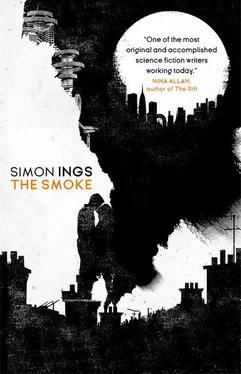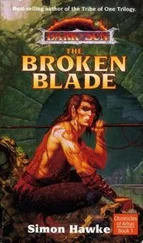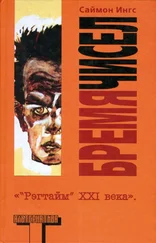I told myself that I would not stay long. That moving in with my dad would be an opportunity for me to regroup, while giving Fel some much-needed space before she and I took up – in a more circumspect fashion – the next chapter in what was obviously going to be a lifelong friendship. We had made some brave noises about staying in touch and remaining friends.
Naturally, we never saw each other again.
The hatch closes on Jim Lanyon’s hand. He whips clear, catching his finger for a split-second between the hatch door and the sill. A dull compression pulses through the nail into the bone.
The tunnel lurches around him and his arm sweeps on a reflex, seeking something to cling to.
His hand finds something soft and lumpy and unmistakably alive. A face. His hand digs in, forefinger and bruised middle finger getting purchase around the arch of an eye even as he cries out in terror: he thought he was alone here.
The face joins in with Jim’s screaming and swivels free of his grasp. His fingers trace thick, dense hair, a woman’s hair, and his autonomous self, that diurnal part of him oblivious to events and circumstances, and which responds only to the routines and the givens of life, pulses out its interest.
The world lurches, throwing Jim and the face and a tangle of limbs and ducting into a new and radically different arrangement. It is as though they were the jumbled elements inside a kaleidoscope and someone is twisting the eyepiece, setting them to a new configuration.
The sound as it twists – this grinding, screaming corridor made kaleidoscope – fills Jim’s head with metal, and he presses his hands against his ears and screams along to the buckling tube like a child on a fairground ride, screaming to take control, to rise to the fear, to perform it, anything so as not to be consumed by it, sensation piling up on sensation as the corridor buckles and twists, every failure a jagged edge, a spark, a scream, a puff of vapour.
He remembers the last time he was afraid like this, and screamed like this. He was a boy, strapped into a fairground ride with his dad. He and his dad had screamed together, surfing together the wave of their imminent destruction, and here, too, there is a second scream accompanying his own and the lights come on again. How long have the lights been out? Jim does not know. He had his eyes tight shut, the better to scream, but his eyes are open now and he sees the face, bare inches from his own, hurtling into him, into his face, filling his vision with shadow, a dark and heavy presence filling his field of view. Then the collision, forehead to forehead in classic silent-comedy symmetry to a soundtrack of mutual screaming, and the corridor thrusts itself straight again, a limb kicking itself back into shape, and the lights go out again.
They breathe together, suck air together, paired in the darkness, and in the eerie blast of cold that stops both their mouths, they are joined in the terror of decompression. But the chill dissipates and, released for a second, their rhythms come apart, each pants to their own beat. Jim is first to speak, if you can call it speaking, a wet swallowing that approximates his name.
The face beside him is a wet, hot presence at his left ear, and upside down – what quality of sound tells him the mouth is upside down he cannot say, but in the pitch dark he is certain that the face, just one inch from his ear, is now inverted. It jabbers something, Venison or Tennyson or some other name he does not recognise. Not on his shift, not on his deck, not in his department. A stranger, even here , thinks Jim, and wants to cry. A dark unknown, suspended in a greater dark.
Hands pat and palpate him, fumbling for purchase, and he feels her breath on his cheek, its hot, wet pulse as intimate and shocking as a tongue, and then it is gone as his hands and her hands find each other in the dark and her hand finds his bruised hand and he gasps with pain and pulls his hand away and the corridor rips along its length as sure and straight as if along a seam and flattens itself, showing them themselves against the stars, as in a vast and cinematic mirror. He loses purchase. She reaches for him, reaches up for him, to hold him fast, but she cannot reach him as he wheels above her, a new star, spreadeagled, Union Jack patch bright and primary against the welling Earthlight. The woman – Tenterden? Verizon? What’s in a name? – turns to face that massive and appalling planet whose light and mass and heat they have so recently escaped. Jim, floating above her, waves desperately, while she clings to a stanchion in the unwound tunnel, her flesh gently swelling as though she were blooming in the light of Earth, and her outgoing breath is a puff of ice crystals that Jim, in his own anoxic, depressurised and surely dying state takes to be seeds or spores spilling from her puffball mouth. He fancies that she is shouting his name. But he knows he is only bootstrapping cold comfort for himself in these, his last seconds, and as the Earth rises over the metal ribbon in which they were wrapped, it comes to him that death is taking its own sweet time, and seems indeed to have forgotten him.
For the longest time he hangs there, spreadeagled British star, contemplating, as he pulls away, the wreck of all personal and national hopes, and why can he not die?
Jim sees with a sinking heart that the ship has buckled, failing at the place, the joint, that even a child would have pointed to and said, The weak spot’s here . The giant shock absorbers have shivered and flung their sockets, sending engine and crew tumbling into different, equally unstable orbits.
This undying man, this British astronaut called James Lanyon, does not understand his life, or why it should continue now that the face he clung to is gone. The face, the hair, her hands on him, her breath upon his cheek. This man turned dying star looks for the woman whose name he cannot figure and sees the corridor in which they were caught, spread wide and flattened like the tube from a roll of toilet paper. He sees her, tethered to a pipe by a yellow harness. She had been safe, he sees. She had been trying to save him. She had not careened into him. He had careened into her. She was the still point in that space: his anchor. And here she is, her breath a thousand spores scattering in barren space, her flesh blue and swollen, oedema puppying her, making a doll of her, a thing of fabric more than flesh, and he remembers her breath on his cheek. He feels tears, and how is it that his tears float liquid in his eyes, turning the wreckage before him into so many threads of light? How can his tears be wet, when her eyeballs are ice?
And thinking this, he lets his gaze drift away, which has been focused on the painfully fine grain of the stranger’s body. His field of attention widens, threads clearing as he blinks, to take in more, and yet more, as he is led away (by whom? by what?), his field of view expanding with distance as he travels, faster and yet faster, from the scene of the disaster. He sees it whole now: the frigate-sized living quarters on whose behalf the Victory ’s great elastic heart once, and so very briefly, beat out a nuclear pulse. Where is that valiant engine now, its pneumatic legs spread and pulsing, appendages of an atomic space-jellyfish?
* * *
The ship’s drive was a spinning disc of concrete, and through its centre, once every four seconds, nuclear devices were fed by a machine that, but for its size, would be familiar to any vending-machine engineer. When the ship buckled the living quarters, fighting free, limped off crippled, bent askew and barely space-worthy: certainly no match for the rigours of reentry. In the tense hour following the accident, the crew held a silent vigil, all ears to the Tannoys on every deck and stair. Now all was being stored away again, as the doomed spacefarers set about softly tidying their tomb. With motive power gone, all was afloat. In silence, the crew moved listlessly, securing all the things they had already unstrapped, so cocksure, once the atomic engines had begun to pulse and the floors had begun, in jerks at first, and then with greater smoothness, to deliver the promised one-gravity.
Читать дальше












